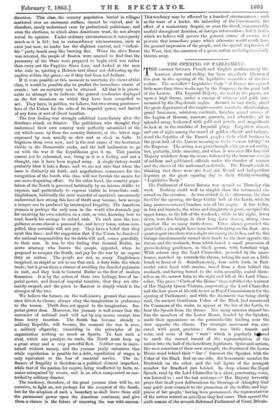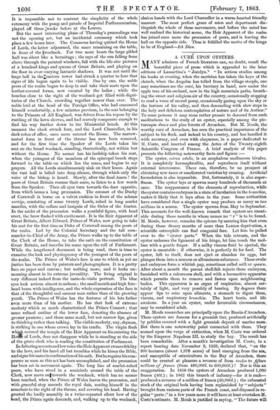THE OPENING OF PARLIAMENT.
THE contrast between French and English parliamentary life, between show and reality, has been singularly illustrated this year in the opening of the legislative assemblies of the two realms. The so-called " Legislative Body " of France was opened little more than three weeks ago by the Emperor, in the great hall of the Louvre. His Imperial Majesty, we read in the papers, sat upon a high throne, under a canopy of crimson and gold, sur- mounted by the Napoleonic eagles. Around, in vast circle, stool the great dignitaries of the-empire,—court marshals, chamberlains, grand huntsmen, ministers, cardinals, knights, grand crosses of the Legion of Honour, senators, generals, and admirals ; all in splendid array, bedizened with gold and jewels, and magnificent to look at in the sunshine of Imperial glory. Forgotten almost, and out of sight among the crowd of golden officials and lackeys, stood the deputies of the French people; their chief business in the great hall of the Louvre seeming to be to " swear fidelity" to the Emperor. The acting was gone through with great solemnity, but, probably, little sincerity, and when it was over His Imperial Majesty withdrew from the scene, followed by the immense cortege of soldiers and gold-laced officials, under the thunder of cannon and the cheers of the uniformed multitude. The French exult in thinking that there were -five bond fide liberal and independent deputies at the great opening day in their fidelity-swearing " Legislative Body."
The Parliament of Great Britain was opened on Thursday this week. Nothing could well be simpler than the ceremonial ob- served on the occasion. At two o'clock in the afternoon, the time fixed for the opening, the large Gothic hall of the Lords, with its long morocco-covered benches, was all but empty. A few ladies, in furs and bonnets, the wives and daughters of peers, occupied the upper forms, to the left of the woolsack ; while to the right, lower down, were five bishops in their long lawn sleeves, sitting close together like so many turtle-doves. Utter silence pervaded the great hall; a pin might have been heard dropping on the floor. At a quarter-past two there was a slight stir among the ladies, and the five bishops simultaneously turned their heads to the door opposite the throne and the woolsack, from which issued a small procession of grave-looking gentlemen, in black gowns, with horsehair wigs. With solemn step the Lord Chancellor, preceded by the mace- bearer, marched up towards the throne, taking his seat on a little bench in front of it. Simultaneously, four noble lords, in (heir scarlet robes lined with ermine, issued from a door behind the woolsack, and having bowed to the calm assembly, seated them- selves on the narrow form to the right and left of the Lord Chan- cellor. The grave " Clerk of the House" then unfolded the warrant of Her Majesty Queen Victoria, empowering the Lord Chancellor and the four peers at his side to act as Royal Commissioners for the opening of Parliament ; and while the document was being slowly read, the ancient Gentleman Usher of the Black Rod summoned the Commons of the realm to appear at the bar of the Lords, to hear the Speech from the throne. Not many minutes elapsed be- fore the members of the Lower House, headed by the Speaker, made their appearance -on the peninsula-like landing near the door opposite the throne. The strategic movement was exe- cuted with great. precision ; there was little tumult and noise, and none of that " rush" which is popularly beeved to mark the annual inroad of the representatives of the nation into the hall of the hereditary legislators. Quiet and serious, like men conscious of their own strength, the deputies of the Lower House stood behind their " bar ;" foremost the Speaker, with the Usher of the Black Rod on one side, the honourable member for Droitwich on the other, and the tall figure of the youngest member for Bradford just behind. In deep silence the Royal Speech, read by the Lord Chancellor in a clear, penetrating voice, was listened to ; and the last sentence—" Her Majesty fervently prays that in all your deliberations the blessings of Almighty God may guide your counsels to the promotion of the welfare and hap- piness of her people," having been pronounced, the representatives of the nation retired as quietly as they had come. Thus opened the sixth session of the seventh Reformed Parliament of Great Britain. It is impossible not to contrast the simplicity of the whole ceremony with the pomp and parade of Imperial Parliamentarism, played off three ',weeks before at the Louvre. But the most interesting phase of Thursday's proceedings was not the opening act, but an incidental ceremony which took place a few hours later. The Commons having quitted the House of Lords, the latter adjourned, the mace remaining on the table, in front of the 'woolsack. For two more hours the large gilded hall was silent like a hermitage ; the rays of the sun falling from above through the painted windows, full with the life-size pictures of a hundred kings and queens of Great Britain, and playing on the floor in ever-varying fantastic shadows. It was not until the large bell in the:eastern tower had struck a quarter to four that signs of life began again to be visible. One by one, the noble peers of the realm began to drop in and take their seats upon the leather-covered forms, now vacated by the ladies ; while the benches close to the right of the woolsack got filled with digni- taries of the Church, crowding together nearer than ever. The noble lord at the head of the Foreign Office, who had ensconced himself comfortably, a few minutes previous, in the seat belonging to the Primate of All England, was driven from his repose by the rustling of the lawn sleeves, and had scarcely composure enough to find his way further down to the Ministerial bench. At this moment the clock struck four, and the Lord Chancellor, in his dark robes of office, once more entered the House. The narrow- seated form in front of the throne has now been removed, and for the first time the Speaker of the Lords takes his seat on the broad woolsack, standing, theoretically, not within but without the House. No sooner has his lordship taken his seat, when the youngest of the members of the episcopal bench steps forward to the table on which lies the mace, and begins to say prayers. All the Lords simultaneously sink on their knees. Again the vast hall is lulled into deep silence, through which only the voice of the bishop is heard. Slowly, after the final Amen ! the peers of Great Britain resume their seats, to listen to a few words from the Speaker. Then all eyes turn towards the door opposite, from which issues a long procession. The coronet of the Duchy of Cornwall is borne on a velvet cushion in front of the solemn cortege, consisting of some twenty Lords, robed in long scarlet mantles, with the collars and insignia of the Order of the Garter. In the midst of the procession walks a youthful figure, with head erect, the brow flushed with excitement. It is the Heir Apparent of Great Britain, Albert Edward, Prince of Wales, now going to take his seat for the first time as Duke of Cornwall among the peers of the realm. Led by the Colonial Secretary and the tall com- mander-in-Chief of the Army, the Prince walks up to the table of the Clerk of the House, to take the oath on the constitution of Great Britain, and inscribe his name upon the roll of Parliament. While the lengthened document is being read, there is time to examine the look and physiognomy of the youngest of the peers of the realm. The Prince of Wales's face is one to which as yet no justice has been done by painters and photographers. It is a pretty face on paper and canvas ; but nothing more, and it looks un- meaning almost in its extreme juvenility. The living original is very different indeed from the carte-de-visite portrait. The blue eyes look serious almost to sadness ; the small mouth and high fore- head beam with intelligence, and the whole expression of the face is that of the thoughtful and earnest man rather than of the growing youth. The Prince of Wales has the features of his late father even more than of his mother. He has that look of extreme modesty which so much characterized the Prince Consort ; that same refined outline of the lower face, denoting the absence of grosser passions ; and those same small, but not narrow lips, given to thinking rather than talking. The visible modesty, nay, shyness, is striking in one whose crown lay in his cradle. The virgin flush tvhisk. covered the temple of the Heir Apparent on his entering the Ho of Lords, does not disappear while he is standing at the side of the grave clerk who is reading the constitution of Parliament.
In faltering accents and low voice the Heir Apparent swears fidelity to the laws, and his hand all but trembles while he kisses the Bible, and signs his name in confirmation of his oath. But he regains his com- posure as soon as this act has been accomplished, and the procession has been set in movement again. The long line of scarlet-robed peers, who have stood in a semicircle around the table of the Clerk, now move oni towards the woolsack, which has no sooner been reached, when the Prince of Wales leaves the procession, and with graceful step ascends the royal dais, seating himself in the armchair to the right of the throne, and covering his head. Having greeted the lordly assembly in a twice-repeated silent bow of the head, the Prince again descends, and, walking np to the woolsack,
shakes hands with the Lord Chancellor in a warm-hearted friendly manner. The most perfect grace of mien and deportment dis- tinguish the whole of these movements, and before the mind has well realized the historical scene, the Heir Apparent of the realm has joined once more the procession of peers, and is leaving the hall on the opposite side. Thus is fulfilled the motto of the kings to be of England—Ich Dietz.































 Previous page
Previous page